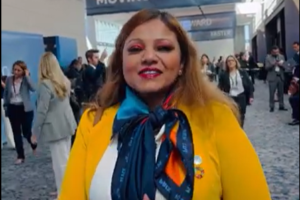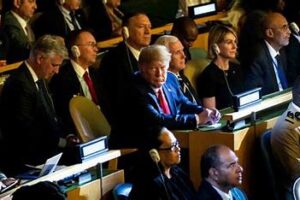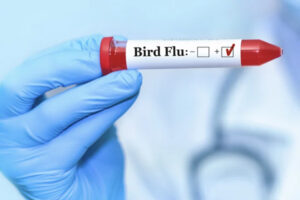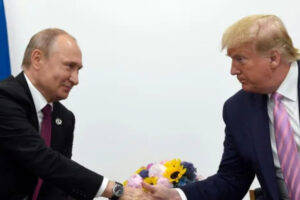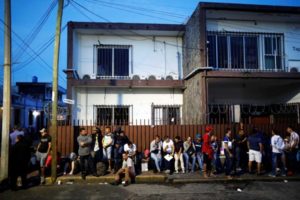Vice President Mike Pence and Sen. Kamala Harris clashed over the Trump administration’s handling of the coronavirus pandemic in a debate Wednesday, with Pence selectively defending parts of the White House response and Harris accusing him and President Donald Trump of presiding over a catastrophic public-health failure.
Harris, the California lawmaker who is Joe Biden’s running mate, assailed the White House from the first moments of the debate, blaming Trump and Pence for “the greatest failure of any presidential administration in the history of our country” because of their approach to the pandemic.
Citing extensive reporting about the White House’s missteps, she charged Pence and the president with having attempted to cover up the potential cost of the disease as it was first hitting the country. “They knew, and they covered it up,” Harris said.
“The president said it was a hoax,” she added. “They minimized the seriousness of it.”
Pence sought to deflect that criticism but did not address it directly, highlighting a few examples of proactive leadership on the part of the administration — like Trump’s decision to ban travel from China — and asserting that Trump had “put the health of America first.”
While he tried to pivot away from an accounting of the White House record, Pence attempted to minimize the differences between the two presidential tickets going forward.
“When you look at the Biden plan,” he said, “it reads an awful lot like what President Trump and I and our task force have been doing every step of the way.”
There was tension between the two candidates from the outset, but the forum proceeded as a far more orderly affair than the barroom brawllike encounter between Trump and Biden last week, during which the president relentlessly accosted his challenger in hectoring and hostile terms. Pence, for instance, began by telling Harris that it was a “privilege to be onstage with you” — the kind of language Trump never used.
Pence was on the defensive from the outset of the debate and grasped for a series of counterattacks to rebut or at least divert attention from the pandemic that has upended American life. He invoked Biden’s 33-year-old plagiarism scandal, cited the Obama administration’s response to the less-lethal swine flu and even suggested that Harris’ criticism of Trump’s handling of COVID-19 amounted to an attack on the American people.
Harris rebutted Pence’s swipes with the rhetorical equivalent of pointing to a morbid scoreboard: “Clearly, it hasn’t worked,” Harris said of the administration’s strategy, citing “over 200,000 dead bodies” as evidence.
Even as he defended Trump, Pence struck an implicit contrast with the president. The vice-president looked at the camera and assured Americans those who died of the coronavirus would “always be in our hearts and in our prayers”; he invoked Dr. Anthony S. Fauci, the nation’s top infectious disease expert, to validate the administration’s response to the virus rather than to ridicule him; and he immediately bowed to Harris when she objected to his attempt to interrupt her.
In perhaps the most striking difference from last week, Pence even looked at Harris, the daughter of Jamaican and Indian immigrants, and saluted her on the “historic nature of your nomination.”
The tumult of the last few weeks set the stage for a contentious airing of differences over elemental matters from abortion rights and the structure of the Supreme Court to vaccine safety and the federal response to ongoing health and economic crises.
Though the vice-presidential debate is typically the one night of the campaign when the spotlight shifts to the two understudies, Trump seemed determined to remain in the spotlight. He released a video Wednesday afternoon assuring voters he was enjoying a rapid recovery and offering an infomercial-style testimonial about one of the drugs he has been prescribed. The president also churned out a deluge of tweets into the night, including one that called for the remaining U.S. troops in Afghanistan to be “home by Christmas!”
Two events loomed largest in the runup to the debate: Trump’s bout with the coronavirus and his abrupt announcement on Tuesday that he was terminating talks on a coronavirus relief package with Democrats in Congress. The president seemed to have second thoughts overnight about breaking off talks, but his mercurial behaviour and largely unknown medical condition, along with the dimming hopes for an economic rescue package, presented a dire backdrop for Wednesday’s meeting of running mates.
The debate figured to be among the most symbolically consequential vice-presidential duels in recent memory, because of the age of both presidential candidates and Trump’s illness. Either party’s nominee would be the oldest man ever to take office, and Biden would turn 80 midway through a four-year term.
Yet in a political season overwhelmed by a daily torrent of news about a pandemic, a recession and the eruptions of a volatile president, it was not clear that an evening of conventional repartee between running mates had the potential to change the race in a significant way. So far, both Pence and Harris have been relegated to the margins of a contest between two of the best-known presidential nominees in modern times.
In some respects, their low profiles are not surprising. Vice-presidential candidates typically enjoy a burst of publicity when they are selected before assuming their roles as understudies to the two nominees. But rarely has this dynamic been so pronounced as in this election, which features an incumbent who demands the spotlight each day and whose closest competitor for attention is a global health emergency.
The debate could also have long-term implications for a pair of running mates with presidential aspirations of their own. Pence is widely expected to pursue the Republican presidential nomination in 2024, whether or not Trump is reelected; and if Biden is elected, Harris would most likely be seen as his heir apparent in 2024 or 2028, depending on whether he seeks a second term.
While a memorable debate performance — of either the commanding or sloppy variety — may be unlikely to change the course of the 2020 race, it could brand either Pence or Harris in the eyes of the public over the longer term.
Ironically, the version of Harris that Biden’s aides hoped would show up Wednesday is the one that stirs the most painful memories. It is of the candidate who memorably used the first Democratic primary debate last year to batter Biden; just over a year later he would make her his running mate.
For Pence, as both the sitting vice president and head of the Trump administration’s coronavirus task force, the debate posed particular challenges — ones that he has mostly managed to avoid so far by occupying such a small public role in the campaign. Before the debate, he had not faced a sustained grilling over his own leadership in the pandemic, nor had he been pressed in such a prominent setting to reconcile gaps between his own approach to public-health policy and Trump’s dismissive attitude toward a virus that has claimed more than 210,000 lives in the United States.
That uneven approach has yielded an outbreak within the White House that expands by the day, an embarrassing political reality for the president and vice president in the final weeks of their campaign.
Up to this point, Pence has skirted the differences between himself and Trump by ignoring them or flatly denying they exist, even though there have been stark divergences between Trump’s pronouncements about the coronavirus and Pence’s private guidance to federal and state leaders. In public, Pence has often delivered toned-down versions of Trump’s lines: He wrote in The Wall Street Journal in June, for instance, that there was no “second wave” of the coronavirus, even as a surge in cases was beginning in the South and Southwest.
Pence has taken a similarly acrobatic approach to handling presidential missteps or provocations on matters besides the coronavirus. When Trump last month resisted saying he would accept a Biden victory in the election, Pence did not quite contradict the president but said he would abide by the results of a “free and fair election.” In August, after Trump said he welcomed support from followers of the QAnon conspiracy theory, Pence disavowed the group in a television interview but argued implausibly that Trump had not embraced it.
Pence’s habit of deferring to the president had the potential to complicate his debate appearance, and not only on matters of policy. After Trump was widely seen as badly mishandling his debate with Biden last week, there was considerable pressure on Pence to help stabilize his party’s ticket in his faceoff with Harris. But it also carried the fraught possibility that Pence would perform far better than his boss: Throughout the campaign, Pence aides have been encouraged to be careful about promoting the vice president in any way that Trump might view as an attempt to upstage him.
Pence has also been among the most vocal advocates of Judge Amy Coney Barrett’s nomination to the Supreme Court, and his identity as a Christian conservative and a strong opponent of abortion rights had the potential to yield a more strenuous dispute on the subject than did last week’s presidential debate.
Pence’s social views are unpopular with most voters: A recent poll conducted by The New York Times and Siena College found that 60% of the electorate believed abortion should be legal all or most of the time.
For Harris, the showdown in Salt Lake City represented the greatest risk and opportunity of the campaign. After enjoying a few days in the spotlight when Biden named her as his running mate in August, she has largely receded from public view. The coronavirus has limited some of Harris’ travel and the nature of her events, confining her to small groups.
Yet Biden’s campaign has also been purposeful, and careful, about her public appearances. Harris has been primarily dispatched to Black and Hispanic communities to energize core Democratic voters. The campaign has also been selective about her engagements with the media, having her talk with local and niche outlets but mostly avoiding higher-stakes interviews.
But Harris has never shined in spontaneous interviews. Her strength has traditionally been in hearings and speeches for which she has extensively prepared. During the Democratic primaries, the flip side of Harris’ powerful debate-night broadside against Biden was her sputtering response in a subsequent debate to a scorching denunciation of her prosecutorial record from Rep. Tulsi Gabbard of Hawaii. It was the moment Harris’ own advisers saw as perhaps the weakest of her campaign.
Recognizing that Wednesday’s forum may be what most people remember about her public performance during a Trump-dominated campaign, Harris studied Pence intensively and committed a number of attack lines to memory.
But after sparring with Pete Buttigieg, her former opponent in the Democratic primary and Pence’s fellow Hoosier, Harris had to adjust her strategy to be more conscious of Trump’s COVID-19 diagnosis, according to people familiar with her debate preparation.
c.2020 The New York Times Company








